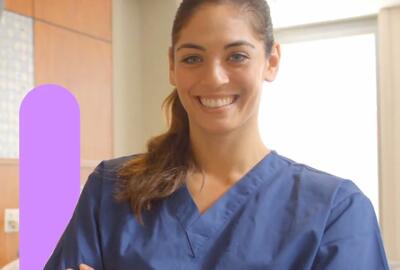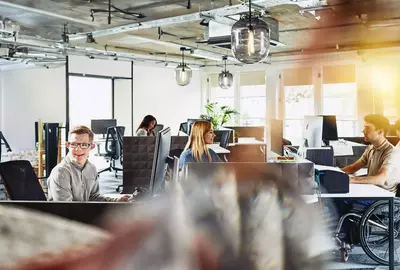IWD 2022: tackling gender bias in the workplace
For those in the know, the idea that diversity and inclusion (D&I) helps to create a stronger workforce is considered a no-brainer in 2022. However, while D&I has enjoyed an increased focus in recent years, unconscious and conscious gender bias remains a challenge for many companies around Australia.
With the theme for this year’s International Women’s Day being #BreakThe Bias, this is an ideal time to look at the creation of more inclusive work environments through the tackling of gender bias and the provision of greater support for women in their careers.
Speaking with a number of Randstad’s female leaders, it becomes clear just how much progress women have made in creating more inclusive workplaces in recent years. However, they also point out how far Australia still has to go.
the importance of inclusion
When talking about D&I, it’s important to remember that diversity and inclusion are not the same things. They’re so often thrown together that it’s tempting to view them as synonyms, but inclusion is the often overlooked and neglected half of that pairing.
Unfortunately, it’s entirely possible for companies to have a diverse workforce while either consciously or unconsciously maintaining policies that fail when it comes to inclusion. After all, a staff with a female majority can still work in an environment where male workers are able to participate more fully. So, while it may be tempting to look around at team meetings, see people from all walks of life and think the D&I job is done, the truth is that diversity is only half the battle.
“It takes courage and commitment to create a truly inclusive workplace,” explains Jo Jakobs, Randstad Australia’s Director of Business Support. “You can think you’ve created an inclusive environment, but it’s not until you check in with others and discover that perhaps their experience has not been an inclusive one that you realise the work that’s still to be done.”
The checking in that Jo describes cannot be overestimated in its importance. Listening to employees is a cornerstone of the inclusive workplace. Without it, it’s impossible to know just what the day-to-day experience is for individual team members and what issues need to be addressed.
Only once these issues have been identified through regular check-ins can solutions be found. However, these solutions need not be sweeping grand plans that change companies from the inside out – although there is certainly room for those too. As Randstad Australia’s Human Resources Director, Felicity Empson, explains, implementing even just one modest measure can significantly contribute to a more inclusive environment: “Like many organisations, Randstad supports flexible working, but we also ensure that everyone has equal opportunities to participate. Sometimes it's as simple as ensuring that the ‘fun’ events don’t all happen on a Friday.”
It really can be that easy to make a positive change. By just hosting events at different times of the week, a broader range of employees is empowered to participate. Basic policies like this one can make an enormous difference in a company’s inclusivity.
The aforementioned check-ins also present an opportunity to have what Randstad Australia’s General Manager of Diversity and Inclusion Madeline Hill calls “great conversations”. These “honest, purposeful discussions about future aspirations” can be used to map out clear pathways to success and create a supportive environment that accommodates the unique and changing needs of individual employees.

speaking out against bias
“Gender bias plays out in many forms in the workplace, the majority of which I truly believe are unintentional, but deeply institutionalised in nature,” says Jo.
It’s this unintentional yet institutionalised nature of gender bias that makes it so difficult to combat. But an essential starting point is tackling the way language is used. Doing so can help to create an equitable foundation on which to build a more inclusive organisation. Because, as Jo explains, the words we use matter.
“Something I recognise to this day is based around language,” she says. “A female who has a strong, deeply held opinion is ‘emotional’ whilst a man has a ‘strong opinion’. A woman who thinks from a more creative base is ‘illogical’ whilst a man is ‘a blue-sky thinker’.
“Emotions, empathy, and vulnerability are typically associated with females while men are referred to as strong, logical, and rational. The implied association is negative for females and positive for males. When was the last time a great leader was called emotional? Generally, a great leader is called strong.”
This double standard is one that needs to be called out whenever it appears, and this presents an opportunity for leadership to step up and provide an example for the rest of their organisation to follow.
“Leaders need to be clear about where they stand and share their own learnings and struggles,” Jo explains. “We are human after all. What’s most important is that we are good humans with good intentions.”

It takes courage and commitment to create a truly inclusive workplace.
randstad’s support for women
So, what does Randstad do to combat bias that can act as a positive example to other organisations around Australia?
According to Madeline, the ability to work part-time has had a huge impact on her ability to further her career: “I began at Randstad 11 years ago, working part-time, and am still part-time. Part-time workers are such an incredible asset to a company, one that Randstad recognises and supports. Many companies in the recruitment sector still don't 'do' part-time well or at all.”
With 53 per cent of Randstad’s management team being women, it should surprise no one to learn that Randstad also has a robust maternity leave program – one that was recently updated to ensure new mums receive three months at full pay.
As Jo explains, “Our approach to inclusivity for mums on maternity leave and the way we approach bringing them back into work on their return is the gold standard. We’re saying to all women that we will honour their career and history with us as we support them through a complex time to find the right path for them on their return.”
Felicity believes these initiatives provide a clear example of how times are changing for the better, “I’ve been in the situation where it was clear to me that I would need to work much harder to achieve my career goals in comparison to my male colleagues due to maternity leave. But our maternity offering helps even the playing field. We ensure that women have equal access to learning opportunities, including whilst on maternity leave, and our talent management processes are equitable, imbued with empathy and awareness of the issues impacting women.”
While there is always more work to be done, Randstad Australia’s CEO Nick Pesch is proud of the progress Australia continues to make.

International Women’s Day 2022 is the perfect time for us to reaffirm our dedication to helping create inclusive workplaces both for customers around Australia and within our own organisation.
I’d like to acknowledge the invaluable contribution women have made and continue to make at Randstad every day, and I reaffirm our commitment to developing innovative and industry-leading initiatives that will help to create inclusive and supportive workplaces that will empower women into the future.





